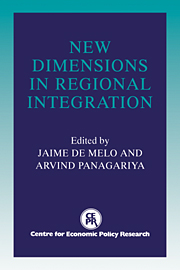Foreword
Published online by Cambridge University Press: 04 May 2010
Summary
The World Bank and the Centre for Economic Policy Research share the objective of promoting economic analysis with policy applications. A dominant concern in the current policy debate is whether the ‘new’ regionalism in trade policy can lead to a more integrated world economy. Will the regional approach promote world-wide economic integration? Or will it work at cross purposes with the more traditional multilateral approach? Are the resources needed successfully to complete the Uruguay Round being diverted into the negotiation of regional arrangements? Is the recent surge in regional arrangements leading to a world of a few trading blocs that will make the negotiation of future reductions in trade barriers easier? Is it likely that a world organised around trading blocs will entail a significant problem of market access for countries left out?
This volume is the outcome of the first collaboration between the World Bank and CEPR. It brings answers to these leading policy issues and advances the debate on the implications of the new regionalism for the world trading system. The contributions to the debate by eminent economists, many involved in policy making, address the choices facing a country that must choose between unilateral trade liberalisation that would be extended to all its trading partners but might be more difficult to implement domestically, and a trade liberalisation that is extended only to its regional partners, but that is more likely to have domestic support.
The volume also reviews the experience with all the major integration arrangements and discusses the prospects for new integration arrangements, including the Middle East and Eastern Europe.
- Type
- Chapter
- Information
- New Dimensions in Regional Integration , pp. xxiii - xxivPublisher: Cambridge University PressPrint publication year: 1993

